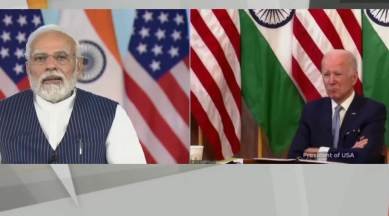President Joe Biden of the United States met virtually with Indian Prime Minister Narendra Modi to discuss Ukraine, as the US wants additional assistance from India to impose economic pressure on Russia.
On the day of the meeting, Modi announced through a translator that he has proposed direct meetings between Russian President Vladimir Putin and Ukrainian President Volodymyr Zelenskyy.
“I spoke with the presidents of Ukraine and Russia on the phone several times,” Modi said. “I not only pleaded for peace, but I also proposed direct discussions between President Putin and President of Ukraine.”
Modi also criticised the killings in the Ukrainian city of Bucha, where the discovery of hundreds of civilian remains following a Russian pullout sparked international anger, and asked for an independent investigation.
Biden, for one, began his meeting with Modi by emphasising the two countries’ defence partnership and stating that the US and India will “continue our close consultation on how to manage the destabilising effects of this Russian war.”
“A deep connection between our people, ties of family, friendship, and shared values, is at the heart of our partnership,” the US president said.
The discussion comprised US Secretary of State Antony Blinken, US Secretary of Defense Lloyd Austin, India External Affairs Minister Subrahmanyam Jaishankar, and India Defense Minister Rajnath Singh, and it came ahead of a “US-India 2+2 Ministerial” meeting later on Monday.
The meetings take place as New Delhi tries to strike a balance between its ties with Moscow and the West.
India is a member of the so-called Quad grouping, which includes the United States, Japan, and Australia and nominally serves as a regional bulwark against Chinese growth, but it has not enforced sanctions on Russia like other countries have.
The United States has made it clear that it does not want India to increase its imports of Russian energy.
India has purchased at least 13 million barrels of Russian crude oil since the country invaded Ukraine in late February, enticed by substantial discounts following Western sanctions on Russian firms. According to figures collated by the Reuters news agency, this compares to around 16 million barrels for the entire previous year.
Daleep Singh, the US Deputy National Security Adviser for International Economics, recently visited India and stated that the US will not impose any “red lines” on India’s energy imports from Russia, but does not want to see a “rapid acceleration” of purchases.
Despite increased purchases from the US in the last decade, Russia has long been India’s largest supplier of defence equipment.
Meanwhile, Biden earlier stated that India’s position on Ukraine was “a little wobbly.”
When the UN General Assembly voted last week to suspend Russia from the 47-member Human Rights Council over claims that Russian servicemen in Ukraine committed rights breaches that Washington and Kyiv have labelled “war crimes,” India abstained.
Biden and Modi will discuss “strengthening the global economy and supporting a free, open, rules-based international order to bolster security, democracy, and prosperity in the Indo-Pacific,” according to White House Press Secretary Jen Psaki.
Ending the COVID-19 pandemic, combating the climate disaster, strengthening the global economy, and supporting a free, open, rules-based international order to bolster security, democracy, and prosperity in the Indo-Pacific were among the topics Biden and Modi were slated to discuss. Psaki explained.
The two presidents last spoke in March during a larger gathering of Quad leaders.
